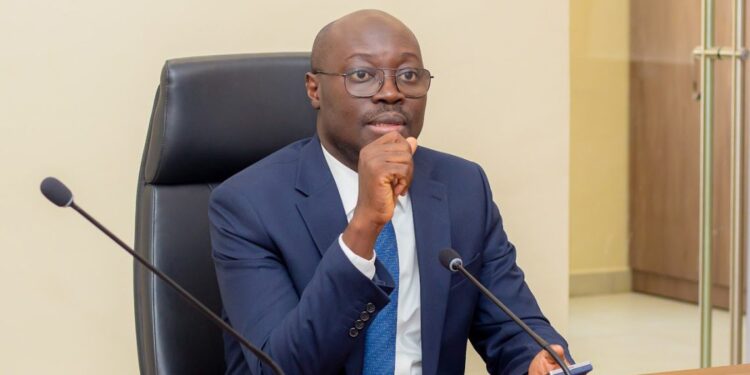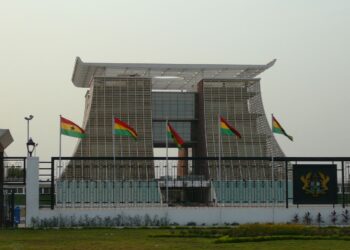Will Finance Minister, Ato Forson act to curb the illicit financial flows?
In the bustling markets of Accra and the gleaming banking halls, our economy hums with the daily grind of traders, miners, and entrepreneurs.
Yet beneath this vibrant surface lies a troubling paradox: billions of dollars quietly slip across borders each year, vanishing into foreign accounts without a single container ship docking or a truckload of goods arriving.
This phenomenon, referred to as capital flight or illicit financial flows, has for decades drained the nation’s lifeblood, exacerbating currency woes and hampering growth.
The investigative bureau of The Inquirer can report that our research from the last five years, specifically from April 2020 to August 2025, corroborated by a Joint Cabinet Momo obtained by this paper, show that many commercial banks broke the country’s export and import laws and anti-money laundering rules by helping dishonest companies and individuals transfer over $20 billion without the matching imports, worsening Ghana’s economic vulnerabilities.
This is about a quarter of the value of the entire economy estimated at about $88.33billion and enough to have transformed the country’s infrastructure. For every dollar sent abroad without imports, Ghana forfeits potential investment in local factories, schools, or roads and results in the vicious cycle of dollar shortages, cedi weakness, and reliance on IMF bailouts.
The perpetuators typically employed Import Declaration Forms (IDFs), a document that gives banks permission to transfer money into offshore accounts of their clients. The majority of the banks gave the culprits limitless transfer options, even though they are intended to deny them another chance to send more money without requiring verification of comparable imports for prior transfers.
Many formal banks are unwitting or sometimes complicit gatekeepers. Ghanaians who have acquired wealth through various means open multiple accounts in secrecy jurisdictions like the British Virgin Islands, Mauritius, or the Cayman Islands, where anonymity reigns. Funds are then wired out under guises including importation, consulting fees, investment remittances, or family support, but without any tangible goods flowing in.
The banks facilitated this through ‘layering-’ where funds bounce between accounts to obscure origins, often using shell companies with no real operations. Customer due diligence is lax, especially for high-net-worth clients lacking full ID documentation.
In Ghana, where foreign exchange controls aim to stem outflows, these transfers exploit gaps in monitoring. A single wire can move millions in hours, leaving no import footprint. As one report notes, African banks’ use of concentration accounts—pooling client funds—further hides illicit origins, enabling seamless integration into legitimate economies abroad.
Broader data analysis showed that on average, over US$3.8 billion is transferred every year from 2020 to 2025 August outside the country without imports on that same IDF.
This average figure is exclusive of transfers, updated figures, and transfers done in different currencies. The USD transfers accounted for over 85% of the number of times remittances were made. 12% of these transfers done without imports are done in the major currencies, Euros and British Pound, in order of frequency. Other currencies contribute the remaining 3% of transfers without importation.
Related Posts
Not all flights require a bank teller. The Hawala system, an ancient trust-based network, thrives in Ghana’s diaspora communities. Senders deposit cash with a local broker, who instructs a counterpart abroad to pay out an equivalent sum—often in euros or dollars—minus a small fee. No paperwork, no imports, just a ledger balanced by honour and future settlements.
This method is popular for its speed and intractability, evading Ghana’s central bank oversight. Couriers smuggling cash or gold across porous borders (e.g., to Togo or Côte d’Ivoire) add another layer, with valuables converted abroad into bank deposits.
In 2024, amid cedi turmoil, anecdotal reports surged of elites using these channels to hoard dollars offshore.
During Ghana’s 2022 debt default, such “flight-to-safety” spiked, with residents snapping up UK properties or US Treasuries.
These are not always illicit; legitimate diversification is fine. But when scaled up—think politicians or mining tycoons moving windfalls abroad—they amplify outflows.
The IMF has flagged how exchange rate volatility and inflation (peaking at 54% in late 2022) drive this, eroding trust in the cedi and prompting pre-emptive exits.
Globally, destinations like the UK and US benefit from Ghana’s “missing” capital, fueling debates on tax haven reforms. The UN estimates curbing African IFFs could unlock $89 billion yearly continent-wide.
Ghana’s government, under its IMF program, is tightening forex rules and boosting digital tracking. International efforts—like the OECD’s beneficial ownership registries, could expose shell games. But true progress demands political will: prosecuting enablers, incentivizing local investment, and stabilizing the cedi to rebuild trust.
As Ghana eyes 2025 growth projections of 5%, closing these leaks is not optional, it is survival. The cedis escaping today could build tomorrow’s prosperity, if only they stay home
Source: Nana Kwame Owusu || TheInquirer










Discussion about this post